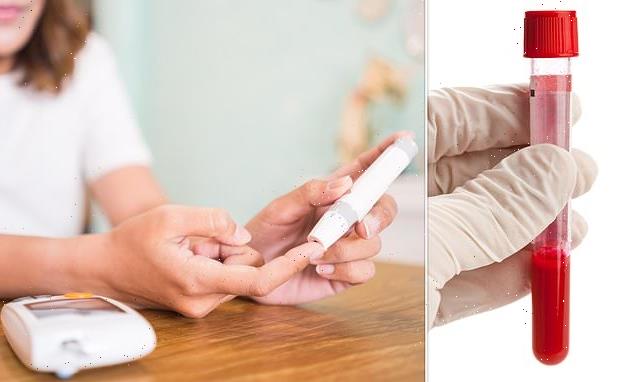Supply chain crisis hits hospitals: Doctors issue warning over ‘severe’ blood tube shortage that is putting patients in a ‘terrible’ position
- BMA says test tube shortages across hospitals and GP surgeries were ‘severe’
- NHS England issued guidance amid a global shortage of blood tube products
- Medical company Becton Dickinson reported temporary supply chain issues
A shortage of blood tubes has put doctors and patients in a ‘terrible, unenviable position’, with GPs facing ‘difficult choices’ about who gets blood tests, the British Medical Association has warned.
The BMA said shortages across hospitals and GP surgeries were ‘severe’ and if the NHS did not reduce usage in the coming days ‘even the most clinically important blood tests may be at risk’.
Earlier this month, NHS England issued guidance amid a global shortage of blood tube products.
It came after medical technology company Becton Dickinson reported temporary supply chain issues for tubes used to collect samples in blood tests.
Britain has been blighted with supply chain issues across multiple industries, with gaps seen on supermarket shelves and McDonald’s running out of milkshakes.
Retailers called on the government to issue temporary visas for EU workers to plug a lorry driver shortage that threatens to disrupt Christmas earlier this week.
All clinically necessary blood tests will go ahead but others have been scaled back.
The BMA urged doctors to follow guidance and carry out ‘only the most critical tests for the time being’.
A shortage of blood tubes has put doctors and patients in a ‘terrible, unenviable position’, with GPs facing ‘difficult choices’ about who gets blood tests, the British Medical Association has warned
Dr David Wrigley, BMA council deputy chair, said: ‘This crisis has put doctors and their patients in a terrible, unenviable position.
‘No doctor knowingly undertakes unnecessary blood tests and to now have to ration all those we are doing, as well as cancel hundreds more, goes against everything we stand for as clinicians.
‘However, if we don’t try to follow the NHS guidance, it’s clear we will get to the point where even the most clinically urgent of blood tests may not be able to be done as we simply won’t have the tubes for the blood to go into.
Why is there a supply-chain crisis?
A lack of lorry drivers and food processors is being partly blamed on the new Brexit visa regime introduced on January 1, which penalises lower-skilled migrants in favour of those with qualifications.
But global factors are relevant too, bosses say, including Chinese port closures and a lack of shipping containers. US Vice President Kamala Harris urged Americans to buy Christmas toys early due to a shortage there.
Nick Allen, chief executive of the British Meat Processors Association, told MailOnline Britain has so far been unable to shake its dependency on EU workers who have been leaving due to the pandemic.
The supply of new workers is also being held back by stricter visa rules introduced on January 1.
The most common complaint among UK retailers and food producers is the shortage of lorry drivers, which the Road Haulage Association currently puts at 100,000.
Thousands of prospective drivers are waiting for their HGV tests due to a backlog caused by lockdown, while many existing ones have left the UK after Brexit or to be back with their families during Covid.
Importers are also suffering a financial hit, with dramatically rising transport costs caused by a global lack of shipping containers and a slowdown in freight movements resulting from port closures.
Chinese authorities recently shut Ningbo-Zhoushan port, which is one of the world’s largest container terminals, due to a Covid outbreak.
Gary Grant, founder and executive chairman of toy chain the Entertainer, said the cost of shipping a container from Asia had increased from $1,700 to more than $13,000 (£8,000) over the past year.
‘We are at a very perilous point and it’s surprising that NHS England hasn’t declared a critical incident given the very strong possibility that NHS organisations may temporarily lose the ability to provide lifesaving diagnostic testing.’
He called on NHS England to provide information for patients about the situation.
Dr Wrigley added: ‘Many GP practices – like mine — will now have to spend hours assessing which already scheduled tests can or cannot be cancelled and this takes time away from frontline patient care when it is most needed.
‘Cancelling tests makes patients anxious and can mean a missed diagnosis.’
On Thursday, NHS bosses wrote to England’s GPs and hospital trusts warning that supply was ‘forecasted to become even more constrained over the coming weeks’.
‘While it is anticipated that the position will improve from the middle of September, overall supply is likely to remain challenging for a significant period,’ they wrote, adding that it was ‘important and urgent that demand is reduced as much as possible’.
Alternative products are being sought but it is expected to take time for these to be imported and delivered in volume.
Health bosses said all primary care and community testing must stop until September 17, except for ‘clinically urgent’ testing.
Acute and mental health trusts must reduce their demand by a minimum of 25% for the period leading up to this date.
Dr Vishal Sharma, BMA consultants committee chair, said such a reduction was ‘highly alarming’ and ‘careful’ decisions were now needed.
He added: ‘It is shocking that this situation has been allowed to develop – in particular, the apparent over-reliance on one manufacturer and the woeful lack of any kind of reserve supply.
‘The manufacturers should also have to explain how they allowed stocks to run so low that patients will now suffer as a result.
‘If we don’t get on top of this shortage – and quickly — then we could very easily end up in a catastrophic position, particularly in hospitals where patients come to serious harm.’
The NHS guidance recommends stopping vitamin D testing except in exceptional circumstances and deferring routine infertility testing unless the patient is over the age of 35.
It also says allergy testing is ‘not a priority at this time’ unless there is clinical need, and that routine wellness screening is ‘not a priority’.
The guidance also advises against stockpiling tubes.
Becton Dickinson and the Department of Health and Social Care have been approached for comment.
Source: Read Full Article

